CIA Sponsored Terror, Civil Liberties, Criminalizing Dissent, Extraordinary Rendition, FBI Intrusion, Habeas Corpus, Human Rights, Iraq War, Military Tribunal, Political Prisoner, Surveillance, Targeting Muslims, Torture, Truth to Power, War Resister
Podcast: Play in new window | Download
Updates:
—

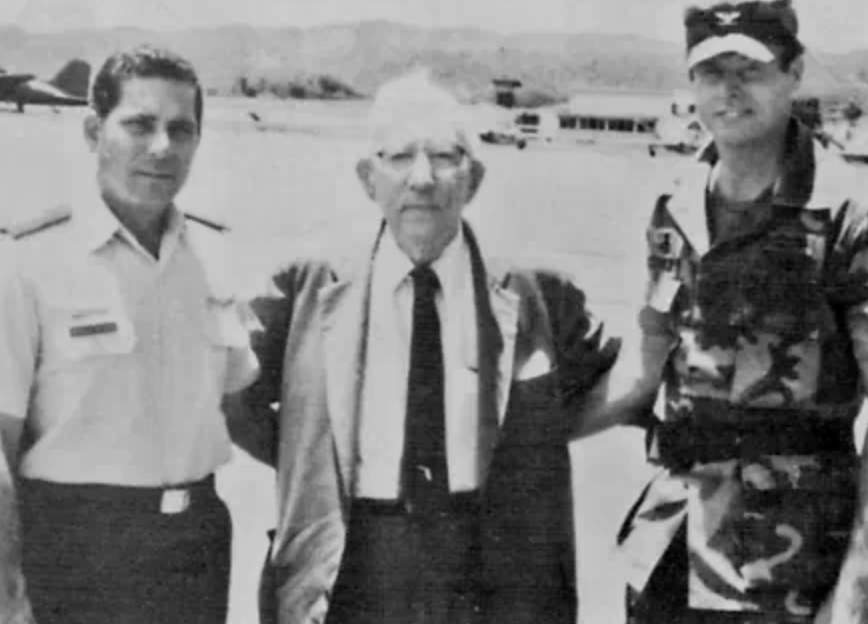
The Search for Colonel James Steele: US Special Forces Veterans Links General Petraeus With Torture In Iraq
A 15-month investigation and documentary film by the Guardian and BBC Arabic James Steele: America’s Mystery Man In Iraq has revealed how US colonel James Steele, a veteran of American proxy wars in El Salvador and Nicaragua, played a key role in training and overseeing US-funded special police commandos who ran a network of torture centers in Iraq. Steele and another special forces veteran retired Colonel James Coffman reported directly to General David Petraeus. Petraeus as listeners may know was tasked with organizing Iraqi security services.
Patrick Farrelly:
- The projections that they made about being welcome in Iraq were just not true.
- It looked like the insurgency at that point in 2004 was just getting off the ground.
- This is where they turned to General Petraeus, I know he’s seen in the think tanks in Washington as the scholar warrior.
- Rumsfeld called upon him to go back into Iraq and to organize a pretty massive police force in Iraq.
- He hooked up with 2 people there, Colonel James Coffman and Colonel James Steele.
- Mill Group is essentially a bunch of military advisers who are training the Salvadorian security forces to fight the guerrillas.
- Colonel James Steele was the guy in charge of the American advisers who were training these people and also directing these forces.
- Counter-insurgency force went from 400 to 17 thousand.
- What the United States needs really badly is intelligence, they need to know who the insurgence are and where they can get them.
- That’s Steele’s expertise, having these guys on the ground, they draw in thousands of people and basically torture them for information.
- It’s Steele’s job to collate that information so that they can then hand it over to the US military. The US can then go after the insurgence informed for the first time.
- Part of the Wikileaks discovery, in terms of the war-logs which was released by Bradley Manning to wikileaks, shows this entire pattern of US soldiers coming across these detention centers,
- – they’re giving consistent reports of seeing torture of seeing abuse.
- Frontline: The Gangs Of Iraq.
- It’s a production line. These young men come in, these people were hung up on ceilings, nails pulled out with pliers, it was water boarding.
- They turned the city library (in Iraq) into a torture center.
- It became this interrogation and torture mill, that no doubt produced a lot of information.
- For empire, people like James Steele are very very important.
- Empires tend to roam into other people’s countries, and you know.
- Where did the sectarian civil war come from? Who played a part in bringing this about?
- James Steele, lives in Texas, at one point he was Vice President of Enron.
- The public is not really aware of what’s being done in the name of US taxpayers in foreign lands.
- I think its clear that the Sunni community is completely disenfranchised. I think its still in a state of terror.
Guest – Patrick Farelly, a TV, radio and print journalist who has worked in the US and Ireland. Farrelly was producer of Michael Moore’s Emmy award-winning NBC/BBC2 series TV Nation and later Bravo/Channel 4 co-production Awful Truth. He was the founding editor of the New York based weekly newspaper Irish Voice and has also been features editor of the New York Post. He has also worked for HBO, Discovery, PBS and Irish broadcasters RTE and TG4.
————–
Civil Liberties, Criminalizing Dissent, FBI Intrusion, Habeas Corpus, Human Rights, Political Prisoner, Surveillance, Torture, Truth to Power
Podcast: Play in new window | Download
Updates:
—-
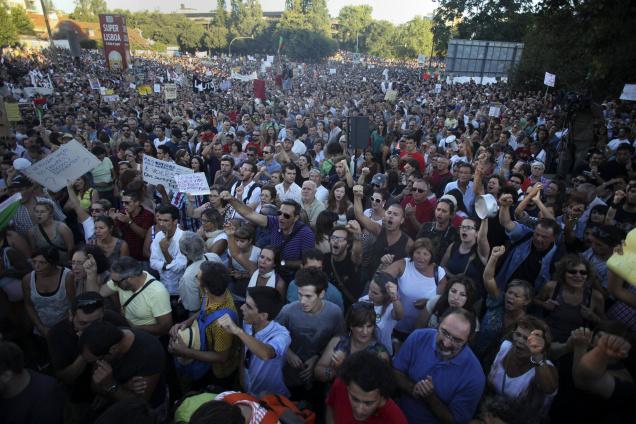
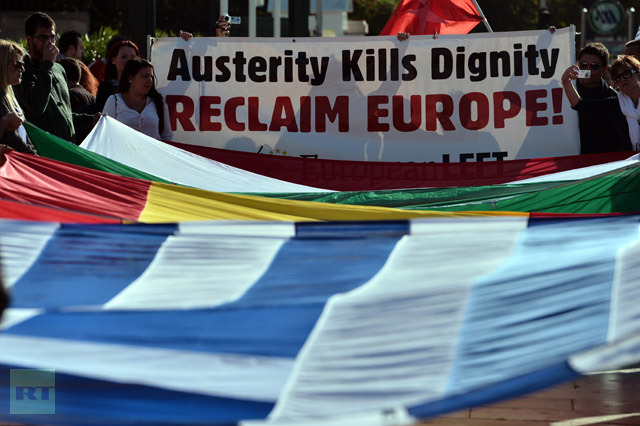
Sequester As A Form Of Austerity In The United States
We welcome Economics Professor and radio host Rick Wolff back on the show to discuss the current billion dollar cuts known as the sequester. The sequester is a massive reduction in US military and domestic spending of up to 85 billion dollars. This is a massive austerity policy that will send ripple effects throughout the US economy. Meanwhile, our guest Professor Rick Wolff points to corporations continuing to use cheap labor that is substituted for “costly” workers in the US and Europe. Professor Rick Wolff has exposed the flawed system of modern capitalism for many years, he joins us today to discuss the new austerity, called sequester as the inequalities of wealth continue to widen. Rick Wolff and Bill Moyers Interview.
Professor Rick Wolff:
- We’ve had basically the same story for most of the last five years. This crisis technically started in the last quarter of 2007.
- If you are an employer, at least a big one, and if you are an owner of shares of stock, you’ve now come back, its taken six years to do it, you’ve now recovered where you were.
- No one predicted a crisis of this depth.
- They are a tiny portion of the American people, those employers and those share holders.
- The unemployment rate before this began averaged under five percent.
- At the worst moment of this crisis in 2009, 2010, unemployment hit 10 percent. Where are we today? Barely under 8 percent.
- Every single family in the United States on average has a person in it, that is going through this process (unemployment) and is therefore becoming a burden to the rest of the family.
- This is a stock market that seems to believe that it doesn’t have to worry about where the mass of people are, doesn’t have to worry about their diminished purchasing power.
- The United States is pursuing an austerity policy.
- Austerity is a very simple idea, it has 2 parts. You raise taxes on average (income) people. Part 2 is you cut government spending throughout the economy.
- That’s what they’ve been doing in Greece for the last 3 years. That’s what they’ve been doing in England and France, and Portugal and Italy and on and on and on.
- . . and we’re doing it too.
- Austerity has been agreed to by Republicans and Democrats alike. There is no debate in this country at least as far as the 2 parties are concerned about austerity.
- The only disagreement Republicans and Democrats have is about what tax increases and cutbacks are going to be done.
- This crazy behavior in which people who can’t agree, punish themselves by not agreeing by agreeing to do something they couldn’t agree to do.
- Fiscal Cliff: All couples that earn more than 450 thousand dollars a year, that was the cut off. Anybody earning less than 450 thousand is 99 percent of our people, were not affected by this “tax the rich” only those above 450. Here’s what happened to them, instead of the 35 percent rate they paid in 2012 under the deal that was struck it was raised to 39.6 percent.
- No rich person in that category will do anything but laugh all the way to the bank, that this was called an attack on the rich.
- You’re not taxing the rich, not even close.
- Payroll tax increase to 6.2 percent. Social Security tax.
- Sequester: All it meant was if the government didn’t reach an agreement, the way they did it the last minute for taxes, these automatic cuts that were automatically written in 2011 when this whole thing was set up,
- would kick in. Well they failed to reach an agreement, and this sequester went into effect on March 1.
- You should be aware that at any time, Congress can make an agreement which supercedes all of this.
- The military does not want or need a good bit of the spending geared up to be given to it.
- It’s not the military that wants it, its the Congressional representation from the companies with the military contracts who want it. So we have this bizarre display, we’ve had it for years, in which the military gives testimony, we don’t need this program.
- The Congress men and women sit their and listen and vote it in anyway. They want the jobs and prospects of the defense contractors who are funding their political campaigns to be protected.
- If you raise payroll taxes which they did, you are damaging the economy in a straight forward, obvious way.
- With more people unemployed, they don’t earn and income, they don’t pay an income tax.
- This is the policy that was followed in Greece, they’ve been collapsing ever since.
- Last weekend was the largest demonstrations in Lisbon, in the history of Portugal.
- Nobody on Wall Street knows what’s going to happen 3 months from now.
- We are not going to escape the turmoil, Occupy was the first sign of that.
Guest – Richard D. Wolff is Professor of Economics Emeritus, University of Massachusetts, Amherst where he taught economics from 1973 to 2008. He is currently a Visiting Professor in the Graduate Program in International Affairs of the New School University, New York City. He also teaches classes regularly at the Brecht Forum in Manhattan.
—————————————————————-
Censorship, Civil Liberties, Criminalizing Dissent, FBI Intrusion, Human Rights, Truth to Power
Podcast: Play in new window | Download
Updates:
Private Prison Corporation To Have Its Name on Florida Atlantic Football Stadium
—
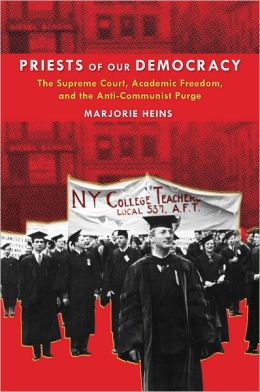
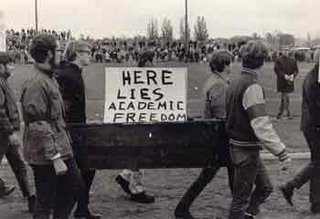
Priests of Our Democracy, The Supreme Court, Academic Freedom, and the Anti-Communist Purge
Priests of Our Democracy, The Supreme Court, Academic Freedom, and the Anti-Communist Purge is the title of the recently published book by attorney Marjorie Heins. The book examines a very dark period in academic freedom within New York City’s municipal colleges. In the early 1940s, faculty, students and staff were the target of massive investigations into their political beliefs and associations. They hauled before tribunals of the New York State legislature, dozens were stripped of their careers.
Author Marjorie Heinz shows historically, that academic freedom is nothing to take for granted and is always on shaky ground despite being protected by the First Amendment. The backlash of controversy against Students for Justice in Palestine sponsoring a Boycott Divest Sanction event at Brooklyn College is recent example. This is a book for anyone working in education to understand the court battles that tried to preserve a right protected by the Constitution.
Attorney Marjorie Heins:
- Boards of Trustees which are dominated by corporate executives don’t like these new scholars in the field of social science who are also activists.
- It’s really an attempt of political purge of this national figure.
- The burgeoning forces of academic freedom rally round him, they see the danger.
- In those early days the main attacks on the activist professors really were on activities outside the classroom in support of labor organizing.
- A bunch of professors get together from around the country and form the AAUP, American Association of University Professors. They for the first time issue a declaration of principles on academic freedom.
- The first is freedom in the classroom. The second is freedom is your research and scholarship to pursue learning where it may lead, which means overturning conventional wisdom.
- The third is what they call extramural speech, outside the walls. That was the main target of repression in that period.
- We have to get all these leftists out of the school system because they’re going to indoctrinate the tender minds of our youth with Marxist ideas.
- Harry Keyishian starts the book, he’s one of the wonderful characters I discovered as I was working on it. The Keyishian v. Board of Regents case, 1967 Supreme Court case is famous among First Amendment lawyers because it reversed prior not so good decisions, strikes down the so called Feinberg law which had been passed in 1949 and upheld by the Supreme Court.
- Feinberg law creates a very sweeping program of loyalty investigations for teachers in the public schools.
- 1952 is the height of the witch-hunt at Queens College in New York City when the Senate Internal Security Sub-committee comes to town.
- The Senate Internal Security Sub-committee starts summoning teachers at city colleges.
- “Would you tell Pablo Picasso that he wasn’t qualified to teach art?”
- It’s obscene to see college administrators running around scared like keystone cops he said.
- Some of these investigations were very broad. What books they read, what magazines they subscribed to, did you have Paul Robeson records in your home?
- It’s not until the Keyishian case in 1967 that the Supreme Court says this whole system of loyalty investigations violates the First Amendment and the due process provisions of the Constitution.
- Marjorie Heins Book Events:
- Revolution Books March 5 is sponsored by the New York Civil Liberties Union – 7PM
- Harvard Bookstore, Cambridge, MA, Friday March 15, 3 pm.
- Talking Leaves Bookstore, Buffalo, NY, Sat. March 23, 5 pm.
- Politics & Prose Bookstore, Washington, DC, Sat. June 15, 1 pm.
Guest – Marjorie Heins, a civil liberties lawyer, writer, and teacher, and the founding director of the Free Expression Policy Project. Her previous book, Not in Front of the Children, won the American Library Association’s 2002 Eli Oboler Award for best published work in the field of intellectual freedom. Other books include Sex, Sin, and Blasphemy: A Guide to America’s Censorship Wars; Cutting the Mustard: Affirmative Action and the Nature of Excellence; and Strictly Ghetto Property: The Story of Los Siete de la Raza. She is a graduate of Harvard Law School.
———

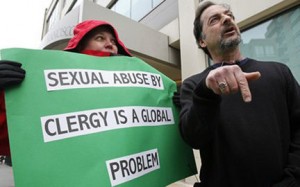
Encore Interview: New Vatican Rules On Handling Priest Sexual Abuse Cases
Earlier this year, the Vatican had revised its laws making it easier to discipline sex abuser priests. The new internal of the Vatican will use faster judicial procedures instead of full ecclesiastical trials. Critics of the revisions, say the Vatican merely tweaked the process and the new rules don’t hold bishops accountable for abuse by priests on their watch or require that they report the sexual abuse to the authorities. In the same report was the inclusion that attempting to ordain women as priests was comparable to heresy, apostasy and pedophilia. To many it was a comparison meant to resist any suggestion that pedophilia can be addressed by ending the requirement of celibacy.
Barbara Blaine:
- SNAP is now a worldwide movement of survivors. We invite supporters join us, we have approximately 10 thousand survivors. Some are spouses and family members but most are survivors; survivors of sexual abuse by priests or other clergy members. Sometimes by religious brothers, by nuns, deacons even bishops.
- We grew in 2002 and 2003 as the headlines were exploding of abuse by priests.
- We have support group meetings in the United States in about 65 different cities. We were extremely naive, not to mention wounded trying to figure out how to make it from day to day. Its empowering for us if we can protect someone who is 12 or 13 from being abused.
- Some documents was released in 2009 in Ireland. Those were the result of government investigations into the allegations of priests and other religious figures sexually abusing children. Victims across Europe, in Germany and Belgium, Austria, Netherlands, England began speaking out and reporting their abuse. In Ireland at the end of 2009, four bishops were resigning their positions.
- From our perspective, what comes out of the Vatican is a lot of lofty words and empty promises. If you look for concrete action, you’ll see very little if any. We as victims are devout Catholics and its really incredible for us to comprehend that someone in the position of authority in the church would not want us to be protected.
- It was heartbreaking and devastating to learn the policy of the church officials is to protect the predators and their assets and their reputations, not the children.
- They’re accountable to no one and its okay for them to continue and commit these crimes.
- The vast majority of victims still do not report. More than 5 thousand priests have been identified are sexual offenders who have abused children between 1950 and 2008.
- 5 percent of priests abusing children. When someone rapes a child they get fired, in the church they get promoted. SNAPnetwork.org / bishopaccountability.org
–
Attorney Pam Spees:
- We joined a conversation with SNAP looking for ways to insure accountability for what’s going on.
- Is there a legal framework that gets at the widespread nature of this. There’s one book out that discusses the 2000 year old paper trail of sexual abuse in the church.
- You’ll hear things like a cardinal or a pope attempt to make an apology. They’re sorry for what happened to these folks. It didn’t just happen.
- It shows the lack of attention and lack of awareness of the gravity of what’s going on and a prioritization of the church protecting itself and its power, rather than insuring the protection of the kids in the church and others who are vulnerable to abuse by priests.
- It also looks like an attempt to decentralize the responsibility. There are key legal experts who have discussed this as crimes against humanity.
- These are acts that are committed as a widespread or systematic assault or attack on the civilian population.
- When you’re talking about the massive sustained harm that is being caused here and the lack of awareness and acknowledgment. . it’s really astonishing.
- The International Criminal Court is a possible venue that has jurisdiction on crimes against humanity.
- The Church can’t be trusted to police itself.
Guest – Pam Spees, senior staff attorney in the international human rights program at the Center for Constitutional Rights. She has a background in international criminal and human rights law with a gender focus, as well as criminal trial practice
Guest – Barbara Blaine, founder of SNAP, Survivors Network of those Abused by Priests, the nation’s oldest and largest self-help organization for victims of clergy sexual abuse.
————————————————————
Civil Liberties, Criminalizing Dissent, FBI Intrusion, Habeas Corpus, Human Rights, Political Prisoner, Prison Industry, Supreme Court, Surveillance, Torture
Podcast: Play in new window | Download
Updates:
—-
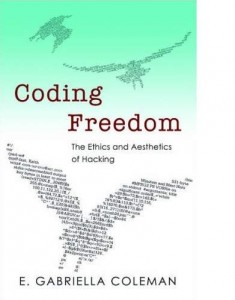

Coding Freedom: The Ethics and Aesthetics of Hacking
In the past 2 years, we’ve discussed in many interviews and updates, the attacks on whistle-blowers and hackers. The emerging movement of programmers, hackers, open source software, online communities has challenged and exposed corporate and government control and surveillance, making them targets of prosecution. As many may know, our own Michael Ratner has represented whistle-blower Julian Assange, computer activist Jeremy Hammond, and has been a legal adviser to many others including the late Aaron Swartz. Today we talk with author Gabriella Coleman about her recently published book Encoding Freedom: The Ethics and Aesthetics of Hacking. It’s a good place to start for those learning about the political significance of free software, intellectual property and the morality of computer hacking.
Gabriella Coleman:
- When you utter the word hacker, usually the image that pops into people’s minds is nefarious criminal. That can be the case but really hackers are composed of an extremely lively group of individuals who tend to be computer programmers and network administrators, who actually are committed to a range of civil liberties such as free speech and privacy. Especially in the last decade they’ve been involved in political activities as well.
- They’re quite a bit of diversity among hackers, technically.
- Hackers – are keenly aware of the issues such as censorship, which impact the present and the future of the internet. Some hackers are committed to insuring internet freedoms for their own productive autonomy.
- Beyond productive autonomy they’re really starting to care about the broader issues relating to internet freedoms and how they relate to democracy at large.
- In order for software to be made, it must be written in a programming language such as C++, Python and Pearl and its written in source code. These are the underlying directions of software.
- A very prominent group of hackers who are committed to always having access to source code have actually reinvented the law to make sure that that source code is eternally available. They’re very much against copyrights and patents and have created something called a copyleft to make sure the source code that powers software is always accessible to them.
- Proprietary software such as the Microsoft Operating System is behind lock and key. We don’t have access to the underlying directions.
- There’s a contingent within the hacker world who believe that access is not only good for the sake of improving technology but is the morally right thing to do.
- That its a collaborative process, that everyone should have access to it. There are other hackers that are a little less concerned about the ethics of access and they’re more concerned about the pragmatics.
- I originally thought that these free software developers who were part of these large projects such as Debion, were raging Leftists. The project itself had collected people from all political orientations.
- Anonymous is a digital phenomena somewhat composed of hackers but not exclusively so, who has engaged in an enormous amount of political activities. They are innovating in the realm of direct action related to digital protest.
- Some will engage in hacking to get information about corporate corruption to leak to the world at large. They also engage in distributed denial of service attacks where a website is so overloaded with requests it comes off line.
- Free software, in order for it to be free speech is also like free beer, you have to make the source code available. But that doesn’t stop people from charging money for support or services.
- In the case of SOPA being passed, there was massive outcry, and massive organization to do something about it to stop it in its tracks. It came from different quarters of society, it came from corporate giants such as google, it came from the Electronic Frontier Foundation, and there was a huge black out where people took down their websites. It had a massive effect and stopped it in its tracks.
- I’m currently working on a book on Anonymous. That should be definitely done by 2013.
Guest – Gabriella Coleman, Wolfe Chair in Scientific and Technological Literacy in the Art History and Communication Studies Department at McGill University. Trained as an anthropologist, she researches, writes, and teaches on hackers and digital activism. Her first book on Free Software, “Coding Freedom: The Aesthetics and the Ethics of Hacking” has been published with Princeton University Press. It is available for purchase and you can download a copy on here.
—-
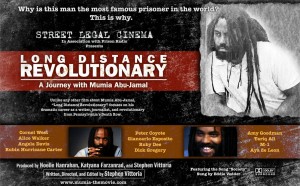
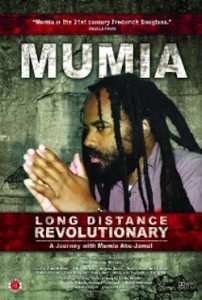
Long Distance Revolutionary: A Journey with Mumia Abu-Jamal
The new documentary, “Long Distance Revolutionary: A Journey with Mumia Abu-Jamal,” is premiering across the country. The film includes interviews from Cornel West, Alice Walker, Ruby Dee, Dick Gregory, Amy Goodman, Michael Parenti, writers Tariq Ali, and Michelle Alexander. This film beautifully captures the importance of Mumia Abu-Jamal’s life as an American journalist, and radical. He published seven books in prison including the best selling “Live From Death Row.”
In Chris Hedges’ review he points out what Cornel West says in the film: “The state is very clever in terms of keeping track, especially [of] the courageous and visionary ones, the ones that are long-distance runners. You can keep track of them, absorb ’em, dilute ’em, or outright kill ’em—you don’t have to worry about opposition to ’em.”
Steve Vittoria:
- The arc of Mumia’s life and the body of his work which is remarkable under harsh and draconian conditions is much more than December 9, 1981. I’ve always seen his life as more than one moment.
- I wanted to tap into what I found was clearly a unique story. Here’s a young man who early on realized he was a revolutionary by the time he was 15 years old.
- He’s writing remarkable work for the Black Panther Party and their newspaper. By 26, he’s a vibrant radio broadcaster and journalist in Philadelphia, reaches NPR and All Things Considered.
- After incarceration, he publishes 7 or 8 books.
- I did from a creative standpoint and a very practical standpoint.
- I wanted to tell a really good story. Any filmmaker, that’s job number one. Mumia, you just have to turn the camera on and you can tell a great story.
- If the film starts to win awards and get fawned over then something’s wrong.
- My favorite interview in the film is Mumia’s sister Lydia Barashango who unfortunately passed away a few months after we interviewed her from her bout with cancer. She went to great lengths to secure her baby brother’s legacy.
- Trying to find what it was like as a young African-American kid growing up in one of the great racist northern cities of Philadelphia, what it was like
- I didn’t realize how funny he could be. He’s kind of a science fiction nerd. He calls himself a nerd.
- Mumia has a very strict schedule for work.
Guest – Steve Vittoria, the writer, director, producer and editor of Long Distance Revolutionary: A Journey with Mumia Abu-Jamal. The film premiered in theaters in New York City earlier this month.
—————————————
CIA Sponsored Terror, Civil Liberties, Criminalizing Dissent, FBI Intrusion, Habeas Corpus, Human Rights, Military Tribunal, Political Prisoner, Surveillance, Targeting Muslims, Torture, Truth to Power
Podcast: Play in new window | Download
Updates:
——
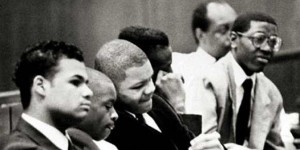
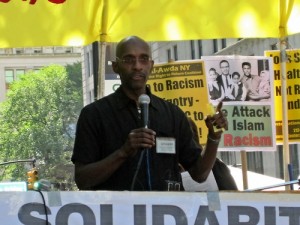
Central Park Five Civil Suit
On April 19, 1989 a group of five black and Latino teenagers were arrested and convicted for the brutal rape of a white female jogger in Central Park, New York City. It was one of the highest profile criminal cases in the city. A New York court overturned the convictions of the five teenagers after a serial rapist confessed to the crimes. By this time of this confession, the five defendants had already served sentences of 7and 13 years. Now, the city of New York is refusing to settle a $250 million decade-long federal civil rights suit brought by the defendants. Attorney Roger Wareham talks more about the case and the Ken Burns documentary on the Central Park Five that could provide footage for the federal civil lawsuit.
Attorney Roger Wareham:
- I’m part of a team of lawyers among five firms that represent the five defendants.
- She almost died. She lost 75 percent of the blood in her body that night.
- The police at some point arrested 30 youths who had allegedly been in the park earlier that night. Some of them were charged with attacking people jogging in the park.
- Most of them had been released, these five were in custody.
- Maybe four or five hours after they were arrested the police received word of this woman who was near death.
- So they held these five children for questioning which basically became and interrogation, which basically became a coerced false confession where each one of them implicated the other ones in the rape and attack of this woman.
- Even though none of them knew each other or what actually happened because they didn’t do it, they just wanted to go home.
- By the time the parents became part of the process, the false statements had already been elicited.
- Especially when a black man is a accused of touching, raping a white woman, logic, justice, objectivity, evidence goes out the window and there’s a presumption of guilt.
- They went to trial and were convicted even though there was no forensic evidence.
- Once they were released from prison they had to register as sexual predators.
- Thirteen years after their conviction, the person who actually committed the crime came forward and admitted he’d done it.
- He was arrested after a failed attempt at a rape. There was an m.o. that he employed with the rapes that he conducted.
- I’m part of a political organization called the December 12 Movement.
- Manhattan’s District Attorney’s office had done a very thorough investigation and this is the same office that had prosecuted them.
- They put forth a really damning affirmation in support of our motion basically admitting they had prosecuted the wrong people, errors had been made. It was clear that the one and only perpetrator was Mateas Raes and they were not going to retry the case.
- Their convictions were overturned 10 years ago, in December 2002.
- Why hasn’t it been settled? You look to Police Commissioner Kelly who endorsed the report.
- Subpoenaing the outtakes is a reflection of their desperation. See, they know the truth. They’re floundering around looking for different straws to grab at.
- Contact the December 12th Movement directly at 718-398-1766.
Guest – Attorney Roger Wareham is a lawyer and political activist of over four decades. He is a member of the December 12th Movement, an organization of African people which organizes in the Black and Latino community around human rights violations, particularly police terror. Wareham is also the International Secretary-General of the International Association Against Torture (AICT), a non-governmental organization that has consultative status before the United Nations.
Since 1989, he has annually presented evidence of human rights violations facing people of color in the United States and other parts of the world at assemblies of the United Nations’ Human Rights Council (formerly the Commission on Human Rights) and its other bodies that meet in Geneva, Switzerland. His work was instrumental in having Mr. Maurice Glele, the U.N. Special Rapporteur on Racism, Racial Discrimination, Xenophobia and Related Intolerance; conduct the first U.N. investigation of the United States in history. Roger Wareham was an active organizer of and participant in the United Nations’ World Conference against Racism held from August 30 – September 7, 2001 in Durban, South Africa.
———————————————————————————
CIA Sponsored Terror, Civil Liberties, FBI Intrusion, Habeas Corpus, Human Rights, Political Prisoner, Prison Industry, Surveillance, War Resister
Podcast: Play in new window | Download
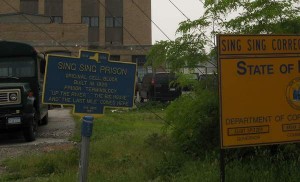
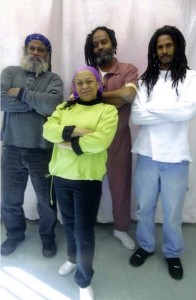
Mass Incarceration Epidemic
On January 19, the Malcolm X Commemoration Committee 1199 SEIU activists presented the 17th Annual Dinner Tribute to the Families of our Political Prisoners & Prisoners of War. It was called Transforming Solidarity: Working Together to End Political Imprisonment and Mass Imprisonment and was held at the Martin Luther King, Jr. Labor Center in NYC.
Professor Johanna Fernandez:
- The Republican Party begins to craft an ideological backlash against an emerging civil rights and black power movement.
- The Republican presidential candidate at the time Barry Goldwater in a speech begins to link crime to the activism of civil rights protesters that are being incarcerated in the south.
- He is deploying one of the most atrocious fears of the white supremacist South in the post-reconstruction era to delegitamize these protests. That black men are going to rape white women.
- What we see happening in the 1960s is that fear is manufactured by these P.R. firms that are working in consultation with Republican leaders but also with police organizations, the Fraternal Order of Police, and the Police Benevolent Association.
- 1968 saw and huge amount of riots especially in the aftermath of Martin Luther King Jr’s assassination.
- The criminalization of black and Latino protesters was the major strategy used to delegitamate the aspirations and the politics of this emerging revolutionary class.
- The Omnibus Crime Control and Safe Streets Act of 1968 legalized wire-tapping and bugging by federal agents and local police without a court order.
- It also legalized on the stop search and seizure by police.
- The police are exempt from the 1964 Civil Rights Act.
- What is the purpose of this crime mania and moral panic? It’s to delegitamize the influence of black and Latino radicals of the working class of color in the nation.
- In 1970s, the apparatus of mass incarceration emerges.
- This apparatus is being deployed against the most vulnerable sections of American society in urban centers. African-Americans and Latinos that are being devastated by a crisis of de-industrialization.
- The poorest people of color are likely to resist, and this class is going to be controlled.
- It was a fabricated crisis of crime that never existed.
- Fear atomizes people they don’t start thinking in terms of community but individual.
- Crime becomes a code word for African Americans, Latinos and increasingly immigrants.
- The Black Panther Party had an analysis of oppression and inequality that addressed its root causes. It identified capitalism which is driven by profit rather than need as the problem.
- But also they had a newspaper and this is important around the issue of mass incarceration.
- Crime is an ideological wedge that is crafted by the Republican Party and the new Right in this nation for the purposes of social control.
Guest – Johanna Fernández, a native New Yorker. She received a PhD in History from Columbia University and a BA in Literature and American Civilization from Brown University. Professor Fernández teaches 20th Century U.S. History, the history of social movements, the political economy of American cities, and African-American history. She has previously taught at Carnegie Mellon University in Pittsburg, PA and Trinity College in Hartford, CT and is, most recently, the recipient of a Fulbright Scholars grant to the Middle East and North Africa that will take her to Jordan in spring 2011, where she will teach graduate courses in American History.
—-
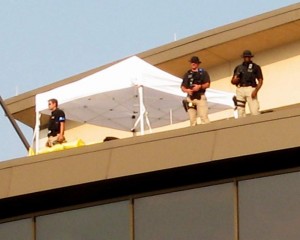

Policing Trends at National Special Security Events
On January 21, 2013, more than 3 thousand law enforcement officers and nearly 13 thousand military troops were activated and deployed to the Washington Mall. This magnitude of security at President Barack Obama’s 2013 inauguration raised the water mark of militarized police mobilization for National Special Security Events (NSSEs) High tech weaponry, mobile checkpoints and a large uniformed presence have become common sights at major sporting events, nominating conventions and international summits. NSSEs were created under President Bill Clinton, a designation that requires federal and local law enforcement to collaborate on event security under the management of the Secret Service. The report was issued by the National Lawyers Guild on NSSE trends is the Guild’s senior researcher.
Traci Yoder:
- The idea that this much security, this kind of multi-level, multi-agency is necessary is the assumption that these events are high profile, will have a lot of people and therefore are likely targets for terrorist attacks.
- There’s been about 40 NSSE’s since the designation was created and these include events like president inaugurations, state funerals, the annual State of the Union address, the Superbowl, Olympics, all International monetary organization meetings and of course the Democratic and Republican National Conventions.
- All to often we’re finding that protesters who are engaging in constitutionally protected and legitimate protest activities are lumped into this security threat.
- Over time, we’ve (NLG) have not only done legal support, we’ve also done a lot of research and writing and analysis of the different kinds of trends we see evolving.
- We wanted to use the RNC and the DNC in 2012 as case studies to look at some disturbing changing trends and express our concern that these security measures are simply becoming more normalized.
- Several months before an NSSE, the local government overrides city codes to create exceptional circumstances for these particular events. That means creating a security zone around the event itself, then limiting How When and Where people can protest within that zone.
- That can lead to limiting the times of demonstrations, the amount of people, the special permitting processes to prohibiting everyday, household items being allowed in the zone.
- What we see leading up to NSSE and this has been very consistent is the DHS and FBI circulating unsubstantiated reports that violent anarchists and outside agitators are plotting to come to these cities really to cause harm and injury – to bring explosive devices, to injure police.
- FBI informants and agents and undercover police were crucial to both encouraging and helping to set up these plots which they then use as evidence later.
- We’re asking law enforcement to stop spreading these unsubstantiated threats of protester violence before NSSEs and acknowledge that most of the violence that has taken place at NSSEs in the past has been on the part of police and not the protesters.
- The combined total of the security budget for the RNC and DNC was 100 million dollars. 50 million dollars going to each city.
- We see the continuation of the militarization of police departments and the NSSEs are playing a part in them.
Guest – Traci Yoder, National Lawyers Guild senior researcher. Before coming to the National Office, she coordinated the NLG Philadelphia Chapter. She holds master’s degrees in Library and Information Studies and Anthropology, with a focus in the latter degree on gender studies and East Africa. In Philadelphia, Traci worked on many projects in addition to the NLG, including the Wooden Shoe Book Collective and the Radical Archives of Philadelphia.

















